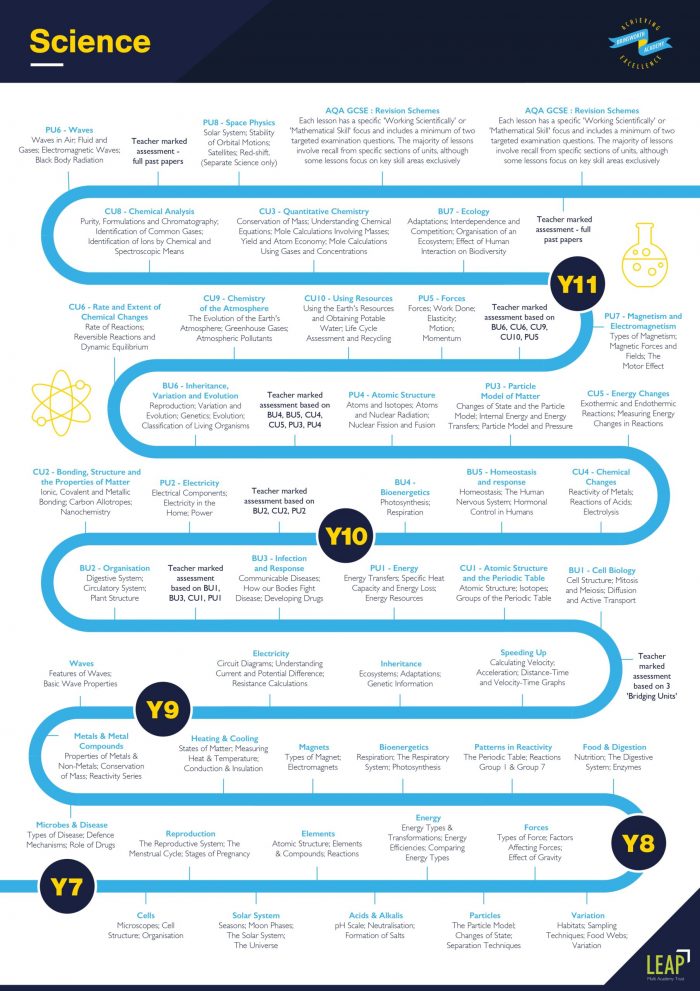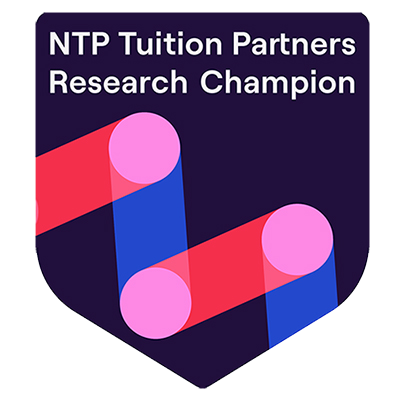“Science is too important not to be a part of popular culture.”
Professor Brian Cox.
Downloads
Overview
Science is a well-established department within the academy with an excellent track record in developing students and leading them towards achieving excellence. We are fortunate enough to have well equipped laboratories and staff seek every opportunity to allow students to learn in an engaging ‘hands-on’ environment.
In years 7-11 science is taught to all students. We deliver a broad curriculum to our students, that covers topics in all of the three major disciplines of science (biology, chemistry and physics).
During science lessons students are encouraged to not only develop their subject knowledge but also enhance their scientific skills. Many of the skills that students develop within science lessons are transferable to other areas of daily life.
We offer students the opportunity to continue their science education after Year 11 through the delivery of A Level courses in Biology, Chemistry and Physics. For those students who prefer a more vocational approach we also run the BTEC Level 3 Applied Science course.
Science is amongst the largest of the departments in the Academy. There are 16 science teachers in the department with a full range of subject specialisms in all three of the science disciplines. The teaching staff are supported by 3 laboratory technicians who ensure that resources are well prepared for each and every lesson.

Science Curriculum KS3 – Year Group Topics Covered:
Year 7
- Cells
- Forces
- Reproduction
- Particles
- Acids and alkalis
- Variation
- Energy
- Elements
- Solar System
Year 8
- Food and Digestion
- Heating and Cooling
- Respiration
- Metals and metal compounds
- Waves
- Microbes and disease
- Magnets
- Patterns in Reactivity
Year 9
- Speeding Up
- Patterns of Inheritance
- Electricity
Science Curriculum KS4 (Commencing during Half Term 2 in Y9):
Specifications used – Student route determined by academic progress
Combined Science Route
AQA – GCSE Combined Science: Trilogy (8464)
Separate Science Route
AQA – GCSE Biology (8461)
AQA – GCSE Chemistry (8462)
AQA – GCSE Physics (8463)
Topics Covered in both routes by specialism
Biology
- Cell Biology
- Organisation
- Infection and response
- Bioenergetics
- Homeostasis and response
- Inheritance, variation and evolution
- Ecology
Chemistry
- Atomic structure and the Periodic Table
- Bonding, structure and the properties of matter
- Quantitative Chemistry
- Chemical changes
- Energy changes
- The rate and extent of chemical change
- Organic chemistry
- Chemical analysis
- Chemistry of the atmosphere
- Using resources
Physics
- Energy
- Electricity
- Particle model of matter
- Atomic structure
- Forces
- Waves
- Magnetism and electromagnetism
- Space Physics (Separate Sciences only)
Science Curriculum: KS5
The subjects offered at Key Stage 5 are outlined below:
- OCR A Level Biology A
- OCR A Level Chemistry B (Salters)
- OCR A Level Physics A
- Pearson BTEC L3 Extended Certificate in Applied Science
OCR A Level Biology A
Module 1: Development of practical skills in biology
- Practical skills that are assessed in the written examinations and through the practical endorsement (completion of practical tasks within school).
Module 2: Foundations in biology
- Cell structure
- Biological molecules
- Nucleotides and nucleic acids
- Enzymes
- Biological membranes
- Cell division, cell diversity and cellular organisation
Module 3: Exchange and transport
- Exchange surfaces
- Transport in animals
- Transport in plants
Module 4: Biodiversity, evolution and disease
- Communicable diseases, disease prevention and the immune system
- Biodiversity
- Classification and evolution
Module 5: Communication, homeostasis and energy
- Communication and homeostasis
- Excretion as an example of homeostatic control
- Neuronal communication
- Hormonal communication
- Plant and animal responses
- Photosynthesis
- Respiration
Module 6: Genetics, evolution and ecosystems
- Cellular control
- Patterns of inheritance
- Manipulating genomes
- Cloning and biotechnology
- Ecosystems
- Populations and sustainability
OCR A Level Chemistry B (Salters)
Development of practical skills in chemistry
- Practical skills that are assessed in the written examinations and through the practical endorsement (completion of practical tasks within school).
Storylines
The following storyline modules introduce a range of relevant chemical ideas in structured and engaging contexts to illustrate the role of chemistry in our daily life and in understanding the world around us.
- Elements of life
- Developing fuels
- Elements from the sea
- The ozone story
- What’s in a medicine?
- The chemical industry
- Polymers and life
- Oceans
- Developing metals
- Colour by design
Chemical literacy
‘Chemical literacy’ is ability to understand a passage of text, extract information from it and use this information, e.g. in a calculation or to construct an argument. Students are expected to be able to answer questions logically and with due regard to the correct use of technical terms.
OCR A Level Physics A
Module 1: Development of practical skills in physics
- Practical skills that are assessed in the written examinations and through the practical endorsement (completion of practical tasks within school).
Module 2: Foundations in physics
- Physical quantities and units
- Making measurements and analysing data
- Nature of quantities
Module 3: Forces and motion
- Motion
- Forces in action
- Work, energy and power
- Materials
- Newton’s laws of motion and momentum
Module 4: Electrons, waves and photons
- Charge and current
- Energy, power and resistance
- Electrical circuits
- Waves
- Quantum physics
Module 5: Newtonian world and astrophysics
- Thermal physics
- Circular motion
- Oscillations
- Gravitational fields
- Astrophysics and cosmology
Module 6: Particles and medical physics
- Capacitors
- Electric fields
- Electromagnetism
- Nuclear and particle physics
- Medical imaging
Pearson BTEC L3 Extended Certificate in Applied Science
Unit 1: Principles & Applications of Science 1 (Externally assessed)
The aim of this unit is to cover some of the key science concepts in biology, chemistry and physics.
- A: Periodicity and Properties of Elements
- A1: Structure and bonding
- A2: Production and uses of substances in relation to properties.
- B: Structure and function of cells and tissues
- B1: Cell structure and function
- B2: Cell specialisation
- B3: Tissue structure and function
- C: Waves in communication
- C1: Working with waves
- C2: Waves in communication
- C3: Uses of waves in electromagnetic communication
Unit 2: Practical Scientific Procedures & Techniques (Internally assessed)
The aim of this unit is to introduce students to quantitative laboratory techniques, calibration, chromatography, colorimetry and laboratory safety, which are relevant to the chemical and science industries.
- A: Undertake titration and colorimetry to determine the concentration of solutions.
- B: Undertake colorimetry to study cooling curves
- C: Undertake chromatographic techniques to identify components in mixtures
- D: Review personal development of scientific skills for laboratory work.
Unit 3: Science Investigation Skills (Externally assessed)
The aim of this unit is for students to develop the skills needed to plan a scientific investigation e.g. how to record, interpret, draw scientific conclusions and evaluate.
Unit 12: Diseases and Infections (Internally assessed)
In this unit students will gain an understanding of five types of diseases, their causes and how humans try to prevent and treat them.
- A: Investigate different types of diseases and infections that can affect humans.
- B: Examine the transmission of infectious diseases and how this can be prevented.
- C: Understand how infectious diseases can be treated and managed.
- D: Understand how the human body responds to diseases and infections.







